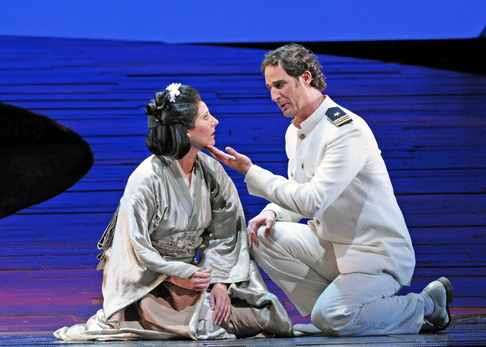This exposure of the individual characters, their hopes
and conflicts, requires that the performers communicate musically in the midst
of shifting narrative turns and a gamut of anguished feelings. The original
production was directed by Michael Grandage with sets and costumes by
Christopher Oram; for Chicago the production is directed by Louisa Muller.
Cio-Cio-San / Butterfly and Lieutenant B.F. Pinkerton are sung by Amanda
Echalaz and James Valenti, both making house debuts. Butterfly’s attendant
Suzuki is performed by Maryann McCormick and the American Consul Sharpless by
Christopher Purves, the latter also appearing here for the first time. The
Lyric Opera Orchestra is led by Marco Armiliato, who makes his Chicago Lyric
conducting debut with these performances.
At the start of Act One the Japanese marriage broker Goro, sung by David
Cangelosi, and Pinkerton discuss business matters relating to the house which
the protagonist has rented for his current relationship with Cio-Cio-San. When
describing both the household members in the service of the bride, and guests
who will attend the ceremony with Pinkerton, Cangelosi’s Goro is masterfully
acted and sung with obsequious gestures and with a good sense of idiomatic
delivery. Mr. Valenti’s Pinkerton seems appropriately distracted when hearing
Goro’s recitation of domestic details. Valenti’s facial expression remained
unchanged during this scene and the following exchange with Sharpless who
enters in a breathless rush to witness on site Pinkerton’s plans. Valenti’s
lyrical spirit emerges when he sings “Dovunque al mondo’ (“Everywhere in
the world”) in his soliloquy to Sharpless on the wandering and risk-taking
Yankee sailor. It is surely this attempt to stay in character, seeking pleasure
until he settles someday with a proper “sposa americana,” that explains
Valenti’s grinning stage demeanor and understated vocal line. At times both
he and Purves’s Sharpless were unfortunately challenged in their vocal
projection by overly vigorous orchestral volume.
As Cio-Cio-San enters with her companions, the excitedness of the young
women is appreciated by their host. Despite her own demure behavior vis-à-vis
Pinkerton this Butterfly is skilled at giving orders to her retinue of serving
companions. Ms. Echalaz sings with secure pitch, at first investing her line
with a noticeable amount of vibrato as a means to expressing her mix
of ardor and nervous expectation. Once her character feels more comfortable in
this conjugal setting, to which she assigns blind faith, Echalaz varies the
expression of vocal color. She describes her few treasured possessions with a
nonchalant tone for the pot of rouge, yet her description of the “cosa
sacra” (“sacred possession”) — the knife of her father’s suicide —
is pronounced with pure, unwavering focus. Once the Bonze, uncle of Cio-Cio-San
and a Buddhist priest, enters and curses her resolve, the ultimate societal and
personal isolation of the young woman has begun. As the Bonze, David Govertsen
delivered an appropriately menacing and lyrically convincing impression, while
also competing with an unyielding orchestral force. The departure of
authorities and extended family leave the protagonists alone for perhaps their
most celebrated expressive music in Puccini’s score. Valenti and Echalaz sang
this duet touchingly from his rising vocal line on “Viene la sera” (“The
night approaches”) to Butterfly’s naïve pronouncements “Ah dolce notte!
quante stelle!” (“Oh, beautiful night! So many stars!”). At times during
this first and the following acts the voices seemed muffled as though the set,
constructed of graduated panels, were absorbing some of the performers’ vocal
projection.
 Amanda Echalaz as Butterfly and James Valenti as Pinkerton
Amanda Echalaz as Butterfly and James Valenti as Pinkerton
Act Two of Madama Butterfly begins as an extended duet for
Cio-Cio-San and Suzuki, the latter despairing over the failure of Pinkerton to
return within three years. Ms. McCormick’s Suzuki featured some of the most
expressive dramatic singing of this performance, as she released rich, dark
pitches in her warnings of their precarious financial household. In reply
Cio-Cio-San’s famous aria “Un bel di” (“One fine day”), assuring her
faith in Pinkerton’s return, was sung with careful attention to top notes
alternating with lines sung piano for their introspective emphasis.
Sharpless interrupts this intimate scene and tries repeatedly to communicate
the contents of Pinkerton’s letter. Purves’s Counsul showed the ideal mix
of anguish and frustration in both acting and singing as he tries to broach the
topic with Butterfly. Once the cannon-shot is sounded, Butterfly is again lost
in her world of determined faith: she and her child, with Suzuki joining in
support, scatter flower petals to signal their welcome of Pinkerton.
The “Humming Chorus” performed between Acts Two and Three was subtly
audible as the central structure of the stage revolved. In the final scenes
Echalaz’s descent into renunciation of her life and child was as complete as
her earlier trajectory of hope. Pinkerton’s brief appearance and aria,
“Addio, fiorito asil,” (“Farewell, flowery refuge”) was here sung by
Valenti with the ability to integrate this vocal piece into the dramatic flow.
His brief lyrical outburst simply added in this production to the tragedy as
Madam Butterfly proceeds to the decision that she realizes is now inevitable.
Salvatore Calomino
Click here for cast and production information.

